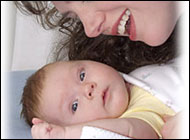Breastfeeding may help prevent bedwetting
Kids who wet the bed are less likely to have been breastfed as infants than infants who stay dry at night, a new study shows.
The study’s authors propose that breastfeeding’s known benefits for nervous system development may be responsible.
“Although we do have to do further studies to confirm these results in a prospective fashion, it’s just another study that emphasizes the fact that breast milk is really the best nutrition for a newborn baby,” Dr. Joseph G. Barone of Robert Wood Johnson Medical School in New Brunswick, New Jersey, the study’s lead author, told Reuters Health.
Fifteen percent of 5-year-olds wet the bed, while 5 percent of 10-year-olds and 1 percent of 13-year-olds do, Barone and his team note in their report in the medical journal Pediatrics. Failure to stay dry at night is medically defined as bedwetting if a child is five or older. However, parents do not usually seek treatment until their child is six or seven years old, Barone told Reuters Health.
Because breastfeeding confers visual, growth and intellectual developmental benefits -probably due to the high long-chain fatty acid content of breast milk compared with that found in formula - the researchers investigated if breast-feeding might protect against bedwetting as well. 
They compared 55 children aged 5 to 13 who were receiving treatment for bedwetting to 117 children who did not wet the bed. The two groups were the same age and gender.
Among the children who wet the bed, 45.5 percent had been breastfed as infants, compared to 81.2 percent of the non-bedwetters. After the researchers used statistical techniques to adjust for other factors that can influence both breastfeeding and the likelihood of bedwetting, the association remained, with children who wet the bed 72 percent less likely than non-bedwetters to have been breastfed.
The effect was only seen if the children had been breastfed for three months or longer, which is consistent with other research showing that breastfeeding must be maintained for at least that long to confer other benefits. Whether or not the breastfed children received supplementation with formula had no effect on the likelihood that they would wet the bed.
To confirm that breastfeeding actually does help prevent bedwetting, Barone said, it will be necessary to follow breastfed and formula-fed children from birth to childhood. If these studies further support this hypothesis, “breastfeeding could be viewed as the first true preventative approach toward bedwetting,” he and his colleagues conclude.
SOURCE: Pediatrics, July 2006.
Revision date: June 18, 2011
Last revised: by Jorge P. Ribeiro, MD